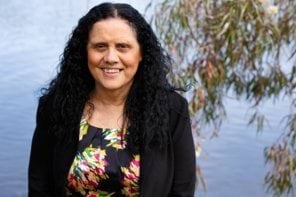
- Inducted:
- 2017
Adjunct Professor Muriel Bamblett is a Yorta Yorta and Dja Dja Wurrung woman who has made an outstanding contribution to Aboriginal welfare, particularly in the area of child and family services.
Born in Carlton in 1953, Muriel was one of nine children. Her parents were Olive Smith Harrison (later Jackson) from Cummeragunja and Eric Harrison of Lake Tyers. Muriel’s mother, Olive, came from a long line of strong women. Although her own mother died when she was a baby, her grandmother, Granny Smith, kept Olive and her brother safe and well cared for. As neither Eric or Olive had had an opportunity for schooling after Year 3, they instilled in their own children the importance of education. Olive was also guided by her strong faith and Christian values which she passed on to her children.
The Harrison family settled in Healesville in the 1950s where Eric worked at the saw mill. The family supplemented Eric’s modest income with fruit picking and other seasonal work. Their small house offered no luxuries for Muriel and her siblings, but home and school life were good. Muriel attended Healesville State School and High School and did well at her studies. After leaving school she attended Riddell’s College in Melbourne where she excelled in her secretarial course.
Working for the rights and welfare of Aboriginal people
Before marrying and having her four children (including triplets), Muriel worked in a variety of office jobs, but later turned her hand to factory and waitressing work at times to support her family. As a young mother, Muriel lived in Queensland for a number of years. From 1982 to 1991 she worked for the Department of Social Security as a Project Officer and Liaison Officer. This was difficult work and brought Muriel into contact with many women experiencing domestic violence.
After her first marriage ended, Muriel returned to Victoria in 1991. This was a fortuitous year for Muriel, as it was when she met her soul mate and life partner, Alf Bamblett. Muriel and Alf had similar spiritual beliefs and also shared a love of music. With Alf’s encouragement and support, Muriel began to work more proactively for the rights and welfare of Aboriginal people. A job at Telstra, as an employment consultant, proved to be an important career move. During her eight years at Telstra, Muriel was able to develop better policies for recruiting Aboriginal workers into diverse areas of the organisation and to foster better relationships between workers and managers.
Chief Executive Officer of VACCA
In 1999 Muriel became the Chief Executive Officer of the Victorian Aboriginal Child Care Agency (VACCA), having been its chair from 1997 to 1999. Since leading the VACCA team, Muriel has expanded the breadth and depth of services for Aboriginal children in need. The agency has grown significantly and is the leading one of its type in Australia. Muriel is proud of the team she heads at VACCA and the work they do: ‘they hear the worst stories, but bring about amazing results … we’ve got young people who are now in university, we used to see our kids going into juvenile justice, chroming, suicide, but now those numbers are so small.’ What drives Muriel is the desire to give children in out-of-home care ‘a connection to culture - they have their Aboriginality, they have a genealogy, and they feel a connection to land.’
Overlapping with VACCA, from 1998 to 2008, Muriel chaired the Secretariat of National Aboriginal and Islander Child Care (SNAICC), the peak Australian agency for Indigenous child and family services. For two years, from 2009, Muriel worked on the Northern Territory Child Protection Inquiry, examining the roles and responsibilities of government to improve services, particularly in rural and remote areas. In the Northern Territory Muriel’s eyes were opened to some of the worst instances of child neglect and deprivation, but also to some of the best examples of lives immersed in language, culture and tradition. The work included examining the quality, sustainability and direction of out-of-home care, staff retention and training, while seeking better ways for stakeholders to work together.
Muriel is active on many boards concerning children, families and the Indigenous community, including the Victorian Children's Council; Commonwealth Redress Scheme Advisory Council; Social Services Task Force; Victorian Government Road Map to Reform Ministerial Advisory Group; Aboriginal Justice Forum; and the Aboriginal Community Elders Service, to name just a few.
Muriel’s contribution to her community and to Victoria has been recognised in many awards including a Centenary of Federation Medal (2001), the Victorian government’s Robin Clark Memorial Award for inspirational leadership in child and family welfare (2003), the Women’s Electoral Lobby Inaugural Vida Goldstein Award for Indigenous Women, a Member of the Order of Australia (AM) in 2004 and inclusion in the Victorian Women’s Honour Roll in 2011.
Recognised by academic organisations
Academic institutions have also recognised Muriel’s work. In 2009 La Trobe University’s Faculty of Health Sciences appointed Muriel as an Adjunct Professor in the School of Social Work and Social Policy. In 2017 the University of Sydney awarded Muriel the Doctor of Letters in Social Work (honoris causa), honouring her leadership in Indigenous welfare and affairs. The award recognised her efforts to bring about welfare legislation in Victoria with a fundamental commitment to the rights of Aboriginal and Torres Strait Islander children, to their families, community, culture and identity.
In 2016 Muriel was appointed to the Aboriginal Treaty Working Group. The group has been negotiating with the State government towards a treaty to enable a greater degree of self-determination backed by legislation and funding for appropriate services.
Muriel Bamblett is an inspiring person, truly committed to the welfare of Aboriginal people. In her words: ‘the greatest gift God gave me is being an Aboriginal person. Being Indigenous to this country really means something to me. I want to be the best I can be.’
Updated

